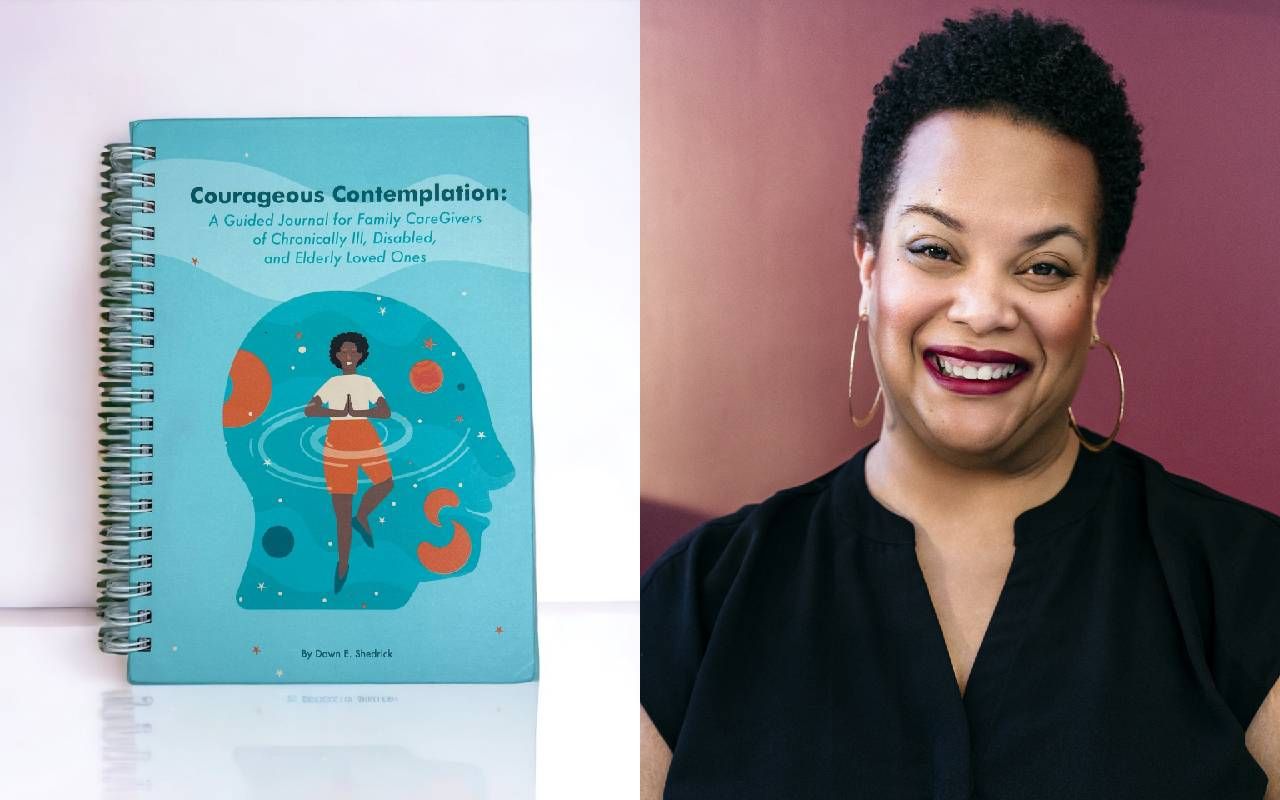An Innovative Journal Created by a Caregiver for Caregivers
This journal allows caregivers to vent frustrations and write and draw what they appreciate about the responsibility
Ask Dawn E. Shedrick for the two most important things a caregiver should keep in mind, and she doesn't hesitate:
- No one is alone.
- We can thrive as caregivers.
Shedrick, 49, is the primary caregiver for her mother at their home in Brentwood, New York. She is also the creator of a creative new tool, a journal called Courageous Contemplation.

"I have been using the journal myself," she said. "I was writing in mine last night because I need it." Shedrick also has a professional perspective on caregiving. She is a Licensed Clinical Social Worker, a lecturer at Columbia University and a minister.
Courageous Contemplation allows caregivers to vent frustrations but also invites them to write and draw what they appreciate about the responsibility. As Shedrick puts it, to "celebrate and release what is healed." Shedrick recognizes that time and energy are precious to caregivers. That's why the suggestions in the journal are designed for as much or as little time as a participant wants.
"I wrote a journal entry about a particular incident where I was resentful. Then I flipped that into a question."
She reviewed themes from her free-form journals, collected over 27 years – the time she has cared for her mother — and used them as prompts. "I just started writing out the themes that were popping out to me. I wrote a journal entry about a particular incident where I was resentful. Then I flipped that into a question."
She also listened to feedback from peers and professionals who are caregivers. Shedrick said using prompts is more effective than writing on a blank page. "I believe what's helpful is that, even if it is open-ended, it's a particular question that allows us to release, reflect and dig into the emotional experience focused on whatever that particular topic or issue is."
Here are four prompts from the journal:
- What is your greatest fear as a caregiver?
- What resentments do you hold about caregiving?
- I feel invisible as a caregiver because …
- What are you most proud of as a caregiver?
Shedrick carefully chooses her words when speaking and writing. In the second of those examples, she intentionally used the word resentments in the plural form. She also included several affirmations in the journal, including, "In light of my caregiving circumstances, I still bloom!"
"It's an emotional, mental isolation because we don't want to ask for help, so we don't. We don't want to admit that we're overwhelmed."
Journals are known to be a therapeutic and creative means of expression."Having the opportunity to let that leave our body in some way, to work through that, because there is research that tell us that it is a viable healing modality to be able to write it out." The journal doesn't have page numbers, allowing a caregiver to start on any page daily.
Expression of different aspects of joy and sorrow around caregiving is encouraged. "I didn't want there to be too many rules. It's another way that I wanted to make it accessible. I wanted to decrease decision fatigue," said Shedrick.
Courageous Contemplation also allows caregivers to express themselves when they don't feel they can talk to anyone else. "There's such an isolating factor. Not a physical isolation. It's an emotional, mental isolation because we don't want to ask for help, so we don't. We don't want to admit that we're overwhelmed. The isolation aspect contributes to people wondering, 'Am I doing this right? Can I do this?'"
Shedrick consults with corporations and organizations as a trainer and facilitator. She also stays connected to her roots as a social worker by serving as a transitional support person for people as they are released from in-patient psychiatric care. "I love that. There's something extraordinary. It's an invitation to me to bring my best self."
In the short time Shedrick has left after all her responsibilities at home and work, she is launching a monthly Facebook livestream, "Caregiving Convos Live." Her guests will be family caregivers who share their experiences. On occasion, she will invite professionals who work in supporting fields.
"There's nothing that's scripted. We go where the conversation goes." While some people may be better than others at caregiving, Shedrick says everyone can care. "I personally believe that we, as humans, have capacity for care. I don't believe that it's anything that is bestowed upon the chosen ones. I think what can make it challenging [is] the lack of awareness of caregiving. We don't have a handbook."
"I personally believe that we, as humans, have capacity for care."
She says it's all about the relationship. "A caregiver's perception of their capacity or skills is connected to their relationship with the person they are called to care for. What's the fabric and the texture of the relationship? What is their awareness of what they believe they need to do, or who they need to be, in order to be a caregiver?"
Caregivers often make comparisons, pointing out that others have it harder or easier than we do. Shedrick sees what we have in common. The Courageous Contemplation subtitle is inclusive – A Guided Journal for Family CareGivers of Chronically Ill, Disabled, and Elderly Loved Ones. That unusual spelling – CareGivers – is Shedrick's preference. She likes to focus on the giving aspect of the job.
Although there is a legal definition of caregiver, Shedrick prefers an open, loose definition. "My definition or idea of a caregiver is not just limited to those of us who live with the people we care for and provide hands-on care. The timing of it, the specific role, the proximity of the person you are caring for, to me, doesn't define that because there still is a thread in our experiences."
"There are days when I only have the energy and the time to knit one row … or write one line in my journal. But I can honor that promise and still find value in that one row."
She has also redefined her title on the front of the book. She considers herself the creator of the journal. The author, she says, is every caregiver who fills in the pages. Because the needs of caregivers change over time, she plans another journal for former caregivers.
As Shedrick's responsibilities at home increase – her mother's multiple sclerosis is progressing – she feels more physical and emotional exhaustion, but she does not give in to negativity. "I have to always have hope. We can have those moments when we can be okay and more than okay. I want caregivers to know that we can still experience joy."
Shedrick practices what she preaches. She makes time every day for journaling, meditation and knitting. "I promised myself that I would do something creative every day. There are days when I only have the energy and the time to knit one row … or write one line in my journal. But I can honor that promise and still find value in that one row," she said.
"Mindfulness has been very important to me. I wouldn't be where I am right now with all of this if it wasn't for mindfulness — that invitation to be in the moment. So that knitting one row is so sweet for me. It's one thing, one creative thing, that I would not have done otherwise. And those moments that I was knitting that row, I could have been sulking."


